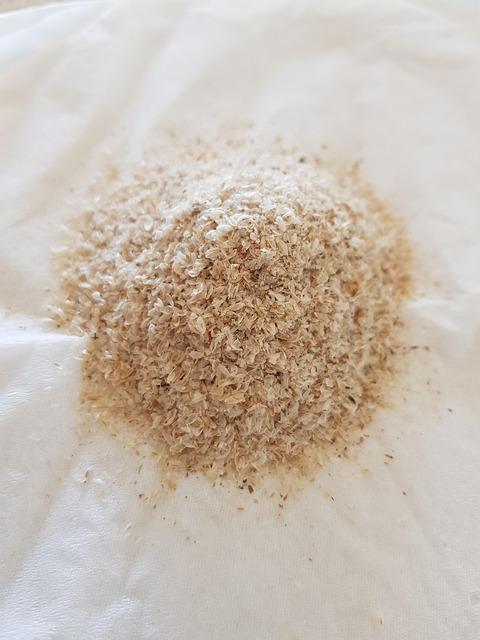In the intricate tapestry of nutrition, few threads are as robust yet gentle as psyllium husk fiber. A dietary powerhouse sourced from the seeds of the Plantago ovata plant, psyllium husk is often celebrated for its remarkable ability to enhance satiety and support digestive health.As modern diets evolve, with fast-paced lifestyles frequently enough overshadowing the need for wholesome nourishment, the quest for effective and natural ways to bolster digestion and manage appetite has become increasingly pertinent. This article delves into the multifaceted benefits of psyllium husk fiber, exploring how this humble ingredient can play a pivotal role in promoting a sense of fullness and fostering a healthy gut. Join us as we unravel the science behind psyllium’s impact on satiety and its promising contribution to digestive wellness, inviting you to consider this versatile fiber as a staple in your dietary journey.
unlocking the Power of Psyllium Husk Fiber for Dietary Satisfaction
Psyllium husk fiber is gaining recognition as a powerful ally in promoting dietary satisfaction due to its remarkable ability to expand when mixed with water.This natural soluble fiber not only soothes the digestive system but also creates a gel-like consistency that helps to slow down the passage of food through the gastrointestinal tract. Consequently, individuals frequently enough feel fuller for longer periods of time, which can substantially reduce the likelihood of unhealthy snacking and overeating. Incorporating psyllium husk into your meals can thus be a game-changer for those looking to manage their weight effectively.
Beyond its role in enhancing satiety, psyllium husk fiber offers numerous health benefits that support digestive wellness. It works by absorbing excess water in the intestines,which assists in forming softer stools and promotes regularity. This action not only alleviates constipation but also serves as a prebiotic, nourishing beneficial gut bacteria. Here’s a fast look at the benefits:
- Weight Management: Helps control appetite and reduces snacking tendencies.
- Digestive Support: Eases constipation and supports bowel health.
- Heart health: May lower cholesterol levels when included in a balanced diet.
| Benefit | Description |
|---|---|
| Satiety Enhancement | Helps maintain a feeling of fullness. |
| Regulated Digestion | Promotes regular bowel movements. |
| Cholesterol Regulation | Assists in lowering blood cholesterol levels. |

Exploring the Role of psyllium Husk in Promoting Digestive Wellness
Psyllium husk, derived from the seeds of the Plantago ovata plant, is increasingly recognized for its remarkable contributions to digestive health. This soluble fiber acts like a sponge in the gut, absorbing water and forming a gel-like substance that helps to regulate bowel movements. By promoting regularity, psyllium husk can alleviate constipation and may also aid in managing diarrhea by solidifying loose stools. When incorporated into a healthy diet, it can definitely help create a sense of fullness, reducing overall caloric intake, making it a valuable ally for those seeking to control their weight.
In addition to its role in improving digestive function, psyllium husk supports overall gut health by fostering a balanced microbiome. The fermentation of its fiber content feeds beneficial gut bacteria, which can enhance nutrient absorption and bolster the immune system. Furthermore, regular consumption of psyllium husk may contribute to lower cholesterol levels, promoting heart health as well. Consider the following benefits:
- Promotes regular bowel movements
- Helps control appetite
- Supports gut microbiota
- May lower cholesterol and improve heart health

Practical Tips for Incorporating Psyllium husk into Your Daily Routine
Incorporating psyllium husk into your daily routine can be a straightforward endeavor that offers a variety of health benefits. One of the simplest methods is to mix a tablespoon of psyllium husk into your morning smoothie or yogurt. This not only enhances the fiber content but also adds a satisfying thickness to your meal, keeping you full longer. You can also sprinkle it onto your cereal or oatmeal for a fiber boost. For those who enjoy baking,consider adding psyllium husk to your favorite bread or muffin recipes. It acts as a natural binder and adds moisture, promoting a softer texture.
Another practical approach is to create a psyllium husk drink. Mix a tablespoon of psyllium husk with a glass of water, and stir well. It’s important to drink this concoction instantly, as it thickens quickly. You can flavor it with a splash of lemon juice or a hint of maple syrup to make it more enjoyable. If you’re introducing psyllium husk into your diet, start with smaller amounts and gradually increase your intake to avoid digestive discomfort. Remember to drink plenty of water throughout the day, as proper hydration supports the fiber’s role in digestive health.

Understanding the Science Behind Satiety and Digestive Benefits of Psyllium
Psyllium husk, derived from the seed of the Plantago ovata plant, is revered for its high soluble fiber content. When ingested, it absorbs water in the gastrointestinal tract, transforming into a gel-like substance. This process not only contributes to increased satiety but also aids in slowing down digestion. As an inevitable result,individuals frequently enough experience a prolonged sense of fullness,which can facilitate better appetite control and potentially support weight management efforts. Some key benefits of psyllium in enhancing satiety include:
- Increased volume: The gel formation elevates the volume of food in the stomach.
- Delayed gastric emptying: This prolongs the sensation of fullness.
- Blood sugar stabilization: Better satiety may help prevent sudden spikes in hunger.
In addition to promoting satiety, psyllium also offers meaningful digestive health benefits.It serves as a prebiotic, nurturing beneficial gut bacteria, which in turn enhances gut health. The fiber content not only helps prevent constipation by adding bulk to stool but also contributes to overall digestive regularity. The table below highlights the comparative impact of psyllium on digestive health versus other common fibers:
| Type of Fiber | digestive Benefits | Satiety Effect |
|---|---|---|
| Psyllium | High water absorption, promotes digestion | Strong |
| Inulin | Prebiotic, aids gut bacteria | Moderate |
| Oat Fiber | Supports heart health, regulates bowel movements | Moderate |
In Conclusion
the humble psyllium husk fiber stands as a powerful ally in the realms of satiety enhancement and digestive health. Its unique gel-forming properties not only promote a feeling of fullness but also support a well-functioning digestive system. As we navigate the complexities of modern diets, incorporating this natural supplement can offer a simple, yet effective means of nurturing our bodies. Whether you seek to curb cravings or improve gastrointestinal comfort,psyllium husk fiber emerges as a versatile component worthy of exploration.By embracing its benefits, you embark on a journey towards a more balanced and health-conscious lifestyle. So, the next time you contemplate your dietary choices, consider the effective and gentle touch of psyllium husk—your gut might just thank you for it.






